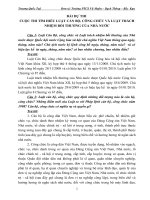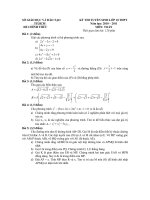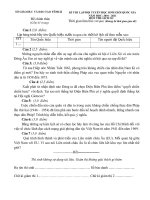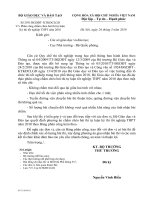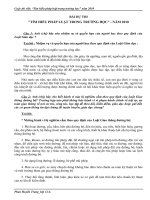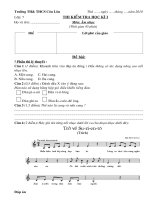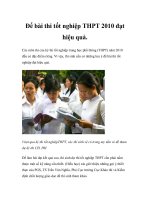Bài thi FCE for Schools 2010 (Listening)
Bạn đang xem bản rút gọn của tài liệu. Xem và tải ngay bản đầy đủ của tài liệu tại đây (516.28 KB, 14 trang )
Centre Number Candidate Number
Candidate Name
D055/4
FIRST CERTIFICATE IN ENGLISH
for Schools
PAPER 4 Listening
Sample Paper
Time Approximately 40 minutes (including 5 minutes’ transfer time)
Additional materials:
Answer sheet
INSTRUCTIONS TO CANDIDATES
Do not open this question paper until you are told to do so.
Write your name, Centre number and candidate number in the spaces at the top of
this page and on your answer sheet if they are not already there.
Listen to the instructions for each part of the paper carefully.
Answer all the questions.
While you are listening, write your answers on the question paper.
You will have 5 minutes at the end of the test to copy your answers onto the separate answer
sheet. Use a pencil.
At the end of the test, hand in both this question paper and your answer sheet.
INFORMATION FOR CANDIDATES
There are four parts to the test.
Each question carries one mark.
You will hear each piece twice.
For each part of the test there will be time for you to look through the questions and time for
you to check your answers.
500/2705/0
© UCLES 2010 Cambridge ESOL Level 1 Certificate in ESOL International
2
Listening „ Part 1
Questions 1 – 8
You will hear people talking in eight different situations. For questions 1 – 8, choose the best answer
(A, B or C).
__________________________________________________________________________________
1 You hear a teacher talking to her class about some project work.
Why is she talking to them?
A to suggest ways of approaching the project
B to explain what their project should be about
C to warn of the consequences of late project work
2 You hear two friends talking about a film they have just seen.
What do they agree about?
A how good the special effects were
B how misleading the publicity was
C how exciting some scenes were
3 You hear a boy talking about a school trip he’s just been on.
What did he think of it?
A It failed to live up to his expectations.
B He found it surprisingly interesting.
C Only parts of it were enjoyable.
4 You overhear a girl leaving a voicemail message.
What is she doing?
A asking for a lift after an activity
B telling someone about some arrangements
C accepting an invitation to a sports event
3
5 You hear the weather forecast on a local radio station.
What will the weather be like this afternoon?
A less cloudy than this morning
B warmer than this morning
C much the same as this morning
6 You hear part of an interview with a young pop singer.
What does she say about her single?
A The song allowed her to express her feelings.
B She had to do a song which was chosen for her.
C It is quite similar to a song she sang on television.
7 You overhear two friends talking about school equipment.
What does the girl think about her new ‘funky dividers’?
A They are a great new idea.
B They are not very attractive.
C They are environmentally friendly.
8 You overhear a boy talking on his mobile phone.
What is he doing?
A asking for help with something
B saying why he hasn’t done something
C passing on some information about something
Turn over
4
Listening „
Part 2
Questions 9 – 18
You will hear an interview with a young tap-dancer called Jodie Markfield. For questions 9 – 18,
complete the sentences.
__________________________________________________________________________________
JODIE MARKFIELD: TAP-DANCER
Jodie says that tap-dancers are often thought of as
9
as well as dancers.
Jodie first got work as a tap-dancer thanks to her
10
The first show that Jodie appeared in was called
11
Jodie says that tap-dancing has both African and
12 origins.
Classical tap-dancers tend to use their
13
more than other tap-dancers do.
Jodie says that tap-dancers need to keep their
14
and ankles relaxed.
Beginners are often told to imagine they are dancing on a
15
floor.
Jodie says it’s important that tap-dancing shoes aren’t too
16
Jodie says that being in a touring show is not as
17 as it sounds.
The only school subject that Jodie’s parents can’t help her with is
18
5
Listening „
Part 3
Questions 19 – 23
You will hear five people talking about the sporting activities they do. For questions 19 – 23, choose
from the list (A – F) what each speaker likes most about their sport. Use each letter only once. There is
one extra letter which you do not need to use.
__________________________________________________________________________________
A It’s a way of making new friends.
Speaker 1
19
B It’s great to feel part of a team.
Speaker 2
20
C It’s a good way of keeping fit.
Speaker 3
21
D It’s a break from schoolwork.
Speaker 4
22
E It’s a chance to show off my skills.
Speaker 5
23
F It’s nice to beat kids from other schools.
Turn over
6
Listening „
Part 4
Questions 24 – 30
You will hear an interview with a young man called Mark Sharp who took part in something called
‘The Iron Age Project’, during which he lived as people did in Britain over two thousand years ago.
For questions 24 – 30, choose the best answer (A, B or C).
_________________________________________________________________________________
24
Why did Mark join ‘The Iron Age Project’?
A
His history teacher suggested it to him.
B
He got involved because of his parents.
C
He offered to take care of the animals.
25
How did Mark prepare for the project?
A
by acquiring appropriate skills
B
by reading about the period
C
by visiting an Iron Age village
26
What does Mark say about living in an Iron Age house?
A
He missed modern conveniences.
B
The fire caused him problems.
C
His bed could have been softer.
27
What did Mark dislike about his Iron Age clothes?
A
The colours were too bright.
B
It was difficult to move in them.
C
He found them rather hot.
28
What did Mark like about his daily work?
A
being part of a team
B
spending time outdoors
C
the physical activity
7
What would Mark have preferred to do in his leisure time?
29
A
listen to stories
B
eat bigger meals
C
go to bed earlier
What does Mark think he gained from the project?
30
A
a better understanding of the past
B
a sympathy with manual workers
C
an appreciation of life today
This is the Cambridge First Certificate in English for Schools Listening
Test.
SAMPLE PAPER.
I’m going to give you the instructions for this test.
I’ll introduce each part of the test and give you time to look at the
questions.
At the start of each piece you’ll hear this sound:
—
***
—
You’ll hear each piece twice.
Remember, while you’re listening, write your answers on the question
paper. You’ll have five minutes at the end of the test to copy your
answers onto the separate answer sheet.
There will now be a pause. Please ask any questions now, because you
must not speak during the test.
PAUSE 5 SECONDS
Now open your question paper and look at Part One.
PAUSE 5 SECONDS
You’ll hear people talking in eight different situations. For questions 1–8,
choose the best answer (A, B or C).
One
You hear a teacher talking to her class about some project work.
Why is she talking to them?
A to suggest ways of approaching the project
B to explain what their project should be about
C to warn of the consequences of late project work
PAUSE 2 SECONDS
—
***
—
Now, what you’ll have to do is find a partner to work with. It doesn’t
matter whether you’ve worked with them before, in fact it might
be better if you haven’t! I’ll give you the outline of the project in
a minute, but just to say that you’ll need to spend some time on
planning – like how you’ll divide up the work between you and so on.
You’ll certainly need the internet, and other sources like books and
you may even want to take yourselves down to the museum. But
don’t forget – the deadline for the completed project is the end of
the month, so there’s no time to waste.
PAUSE 2 SECONDS
—
***
—
REPEAT EXTRACT 1
PAUSE 2 SECONDS
Two
You hear two friends talking about a film they have just seen.
What do they agree about?
A how good the special effects were
B how misleading the publicity was
C how exciting some scenes were
PAUSE 2 SECONDS
—
***
—
M: Awesome film! I’ve never seen effects like those … ever!
F: Well, they were OK – but I wouldn’t go that far! And there wasn’t
much of a story, was there? It was just bang crash all the way. I
found it a bit samey in places, to be honest.
M: But the car chases were spectacular – and scary – it was worth
seeing just for them.
F: I was on the edge of my seat sometimes, no doubt about that. But
after all that hype beforehand – and even a couple of awards –
weren’t you a bit disappointed with the film as a whole?
M: No way! I could sit through it again anytime, no problem.
PAUSE 2 SECONDS
—
***
—
REPEAT EXTRACT 2
PAUSE 2 SECONDS
Three
You hear a boy talking about a school trip he’s just been on.
What did he think of it?
A It failed to live up to his expectations.
B He found it surprisingly interesting.
C Only parts of it were enjoyable.
PAUSE 2 SECONDS
—
***
—
I hadn’t been that keen to go on the trip – it was part of our
geography course and there was a report to do afterwards – it
sounded pretty dull to me and I wasn’t wrong. It also meant missing
my drama class – which was a real shame. The tour of the museum
kicked off with a film about the place, which wasn’t too bad actually,
but after that it was downhill all the way. Although one or two of
the interactive displays were fun, the talks we had to sit through
couldn’t have been less interesting. I’ve finally done the report, but
it’s not very good. I wish I’d gone to drama instead!
PAUSE 2 SECONDS
—
***
—
REPEAT EXTRACT 3
PAPER 4: LISTENING
Sample tapescript
Please note the 5 min pause at the end of the recording is not
represented in real time.
PAUSE 2 SECONDS
Four
You overhear a girl leaving a voicemail message.
What is she doing?
A asking for a lift after an activity
B telling someone about some arrangements
C accepting an invitation to a sports event
PAUSE 2 SECONDS
—
***
—
Hi – it’s me. Sorry I missed you after school – hope you caught the
bus OK! I’ve asked about next Wednesday and the match starts
at six, not seven - so we can meet an hour later if you like – we
must’ve read the time wrong on the poster. Anyway, I’ll be coming
with my sister if that’s OK – she really wants to see it – so if your
brother wants to come along as well then that’d be cool. My Dad’s
agreed to pick us up in the car afterwards – that’ll save us having to
wait for the bus. Call me if there’s a problem – I’ll see you at school
tomorrow anyway. Byeeee!
PAUSE 2 SECONDS
—
***
—
REPEAT EXTRACT 4
PAUSE 2 SECONDS
Five
You hear the weather forecast on a local radio station.
What will the weather be like this afternoon?
A less cloudy than this morning
B warmer than this morning
C much the same as this morning
PAUSE 2 SECONDS
—
***
—
M: So it’s coming up to eleven o’clock and time to go over to Heidi at
the weather centre. Good morning Heidi.
F: Hi Tom.
M: Now, lots of local kids are going to the barbecue in the park later
today. Is the weather going to be kind to them?
F: Well Tom, after last night’s storms we’ve certainly lost that
humidity everyone was complaining about, and temperatures have
fallen overnight. These will pick up again as the day progresses,
however, and we should be in for a nice evening. Although we will
see a build up of cloud later this afternoon, we’re unlikely to see a
repeat of last night’s heavy rain.
PAUSE 2 SECONDS
—
***
—
REPEAT EXTRACT 5
PAUSE 2 SECONDS
Six
You hear part of an interview with a young pop singer.
What does she say about her single?
A The song allowed her to express her feelings.
B She had to do a song which was chosen for her.
C It is quite similar to a song she sang on television.
PAUSE 2 SECONDS
—
***
—
Int: The single’s gone straight to the top of the charts, you must be
pleased – even if it was a while coming.
F: Well, I really didn’t want to rush the decision on a single. In the
end, I went for a song where I could really give my heart and soul
and the producers were willing to go along with that – but it took a
bit of finding actually. A lot of people thought I’d come out with a
ballad like the one I sang at the final of the TV talent show, but to
be honest it’s a relief to have struck out in another direction – one
people wouldn’t have associated me with maybe.
PAUSE 2 SECONDS
—
***
—
REPEAT EXTRACT 6
PAUSE 2 SECONDS
Seven
You overhear two friends talking about school equipment.
What does the girl think about her new ‘funky dividers’?
A They are a great new idea.
B They are not very attractive.
C They are environmentally friendly.
PAUSE 2 SECONDS
—
***
—
F: Guess what my Gran’s bought me now – funky dividers!
M: What are dividers?
F: You know, things you put in your schoolwork files - they help you
sort out all those handouts you make notes on then stuff in any old
how.
M: Oh right. I could do with some of those.
F: Well, it’s hardly rocket science, they’ve been around for years. No
the thing about these funky ones is they’re like made from totally
recycled material – I’m afraid my Gran’s into all that and usually
gets me stuff that’s seriously uncool – but these are actually colour
co-ordinated with the files and stuff I’ve already got. So I can save
the planet for her without everybody knowing!
M: Really?
PAUSE 2 SECONDS
—
***
—
REPEAT EXTRACT 7
PAUSE 2 SECONDS
Eight
You overhear a boy talking on his mobile phone.
What is he doing?
A asking for help with something
B saying why he hasn’t done something
C passing on some information about something
PAUSE 2 SECONDS
—
***
—
This is Ben here. Listen, you know that website you told me about
– the one with the stuff you said would be useful for our history
homework – well I wrote down the address somewhere at school,
but managed to lose it. Was it something like pastlink? Anyway,
I did a search using words like that and came up with some really
great stuff that I thought you might find useful too even if it’s not the
same one – so I’ve sent you an email from that site and you’ll see
the links to some others. Anyway, the homework’s all done now at
least – hope you’re getting on OK. Bye.
PAUSE 2 SECONDS
—
***
—
REPEAT EXTRACT 8
PAUSE 2 SECONDS
That is the end of Part One.
Now turn to Part Two.
PAUSE 5 SECONDS
You’ll hear an interview with a young tap-dancer called Jodie Markfield.
For questions 9 – 18, complete the sentences.
You now have forty-five seconds to look at Part Two.
PAUSE 45 SECONDS
—
***
—
Int: My guest today’s the 16-year-old tap-dancer, Jodie Markfield, who’s
currently touring in the hit show Funky Noise. Jodie, before we hear
some of our viewers’ questions, tell us, what is tap-dancing exactly?
Jodie: Hi there. Yeah – in tap-dancing you wear special shoes with like
pieces of metal in the bottom – so when you dance, you make a
noise. You need a hard surface for tap-dancing, and performers
aren’t regarded just as dancers, but also as musicians. We all work
together with the guitarists and drummers, to get the rhythm and
the sound right.
Int: So let’s go to some of our viewers’ questions. Tina who’s fifteen and
comes from London has emailed to ask: ‘How did you get into tap
dancing, Jodie?’
Jodie: Well, I started at the age of four. I come from a show-business
family. It was my grandmother who taught me the basics, but then
my uncle kind of took over when I showed talent for it. He got me
a part in a show when I was six. My mum was none too sure -
reckoned I was a bit young - but he talked her and Dad into the idea.
Int: Next Linda from Manchester says: ‘Jodie, tell us about the first time
you appeared on TV.’
Jodie: Well, that first show, which was called Showtime, was at the theatre
and I did that for six weeks. One night a TV producer came to see
the show. It was him who signed me up for the TV show Footnotes.
It was easier than the theatre actually, because it didn’t go out live.
So if you made a mistake, you could go back and film that bit again.
Int: OK. Now Mark from Scotland says: ‘Jodie tell us about the origins of
tap-dance.’
Jodie: Well tap-dance as we know it became famous in the mid-twentieth
century when it was in loads of big Hollywood films. But actually it
wasn’t American originally. It all started as a mixture of two much
older types of dancing: An African dance called Juba and traditional
Irish dancing – something that’s been popular again recently.
Int: Right. Now, Ashley asks: ‘Are there different sorts of tap-dancing?’
Jodie: Two main types. So you have to decide which one you’re gonna
do. Classical tap’s more like ballet and dancers use their arms a lot
to make elegant movements. Hoofing is the other type. Here the
dancers concentrate more on their legs and footwork – they really
try to make their feet sound like drums.
Int: Finally, Gary asks: ‘How do you know if a tap dancer is any good?’
Jodie: Well, Gary that’s a good question! Basically, the aim in tap-dance
is to produce clear sounds with each one separate. The knees and
ankles need to be relaxed at all times, without that it can sound all
wrong! So that’s how a dancer is judged, along with speed, rhythm
and stuff.
Int: And what about lessons Jodie – lots of listeners have asked about
that?
Jodie: Well tap classes generally last about an hour – beginning with a
warm-up to stretch the muscles. Lots of kids do tap dance because
it develops physical fitness and is great fun too. Beginners are
sometimes told to dance as if the floor was made of glass! That
makes them think about the position of their feet and not to just
stamp around any old way.
Int: And what about equipment?
Jodie: You need good shoes, of course. Some have heels, some don’t –
both are quite comfortable. But the key thing is that they’re the right
size – they mustn’t be big, your feet shouldn’t move around in them,
so go for some that are quite tight fitting.
Int: Thanks Jodie. Now before you go. You’re touring in the show Funky
Noise – what’s that like?
Jodie: Life on the road sounds glamorous, but it’s quite ordinary really. I
still have to do my homework, cos I’m still enrolled in High School in
my hometown. But my parents travel with me and home-school me.
Int: How does that work out?
Jodie: Well, Mum does the English; Dad the Maths and Science. The only
thing they can’t do is the IT – I school them in that! And I still find
time for my PlayStation games and watching TV!
Int: Jodie – thanks for joining us today.
PAUSE 10 SECONDS
Now you’ll hear Part Two again.
—
***
—
REPEAT PART 2
PAUSE 5 SECONDS
That is the end of Part Two.
Now turn to Part Three.
PAUSE 5 SECONDS
You’ll hear five people talking about the sporting activities they do. For
questions 19 – 23, choose from the list (A – F) what each speaker likes most
about their sport. Use each letter only once. There is one extra letter which
you do not need to use.
You now have thirty seconds to look at Part Three.
PAUSE 30 SECONDS
—
***
—
Speaker 1
PAUSE 2 SECONDS
I’ve been in the tennis team for a couple of years now, and
represented the school in a couple of tournaments. I didn’t actually
win most of my matches, because there were some amazingly
skilful players there from other schools – but it was a great
experience just getting to play against them. If I had to say why I go
for tennis rather than any other sport, I guess it’d be because you
get a good all-round workout – which keeps you in good shape – but
you can do a lot of the training in your own time. I’ve never really
been keen on group training sessions; you know, like friends who do
hockey or whatever have to do.
PAUSE 3 SECONDS
Speaker 2
PAUSE 2 SECONDS
People always think that football’s a very competitive sport – that
it’s all about beating other schools – but that isn’t why I play really.
I’m really into fitness and I do lots of different sports - but football’s
the big one for me, and I think it’s because I’ve got a sort of gift
when it comes to ball control. So when mates in the team pass the
ball to me, I reckon it’s because they know what I can do with it. My
brother’s doing sports science at college. That must be awesome
– combining schoolwork and sports – that’s what I want to do
someday too.
PAUSE 3 SECONDS
Speaker 3
PAUSE 2 SECONDS
Volleyball’s, like, the only sport where boys and girls really get
to play together – I hate the idea of the girls’ football team, for
example, as if we’re kind of not up to the real thing. I wanted to do a
sport this year because we’ve got quite a heavy workload at school
and I really need to let off steam occasionally. Volleyball does that
for me. Don’t tell our coach, but I don’t actually care whether our
team wins or not when we play other schools – I play for the fun of
it – and I’m getting a bit better at some of the key skills, like serving,
too – which is kind of satisfying.
PAUSE 3 SECONDS
Speaker 4
PAUSE 2 SECONDS
Basketball’s kind of fast and exciting and you really get a chance to
build up both your skills and your fitness if you play it often enough.
I’m not that brilliant actually, but I get a lot of support from the
guys on the team – and they’re what really makes it special for me.
Some of them are really incredible at passing and I pick up a lot of
tips from them. It’d be great if our school could win more matches
because our record’s not been that great this season – but I think
we’ve just been unlucky. We could’ve beaten some of those other
schools easily – but things just didn’t go our way.
PAUSE 3 SECONDS
Speaker 5
PAUSE 2 SECONDS
I’m not such a brilliant swimmer, so it was a shock when I was
chosen for the school team and I’ve really had to work hard on my
technique to keep my place. But I’m not a very competitive person,
so at first I was all, like, you know, ‘it doesn’t matter if we win or not
– it’s just a sport’. But then, when we swam against other schools,
all that changed. And when we did actually win a race, I mean, that
was like totally awesome. All my friends were really proud of us!
My teachers even reckon my schoolwork’s improved thanks to the
swimming – would you believe it?
PAUSE 10 SECONDS
Now you’ll hear Part Three again.
—
***
—
REPEAT PART 3
PAUSE 5 SECONDS
That’s the end of Part Three.
Now turn to Part Four.
PAUSE 5 SECONDS
You’ll hear an interview with a young man called Mark Sharp, who
took part in something called ‘The Iron Age Project’, during which
he lived as people did in Britain over two thousand years ago. For
questions 24 – 30, choose the best answer (A, B or C).
You now have one minute to look at Part Four.
PAUSE 1 MINUTE
—
***
—
Int: ‘The Iron Age Project’ took place last autumn when twenty
volunteers lived for three months as people did two thousand years
ago. A television programme was made about their experiences.
Mark Sharp, seventeen at the time, was one of those volunteers.
Mark, what a great opportunity to go back in time and live in the
Iron Age! How did you come to join the project?
Mark: Well, the project was a joint one between the history department of
the local university and a TV company. The history professors had
some theories they wanted to try out and the TV company thought
it would make a good programme. They wanted everything as
authentic as possible and were keen to have people with experience
of livestock – one of the things we iron-agers had to do was look
after cows and sheep. I accompanied my mum and dad, who are
sheep farmers and just the kind of people the organisers were
looking for.
Int: Did you have to do any training before the project started?
Mark: Yeah, it was pretty intense. We were shown Iron Age ways of
growing food, cooking – stuff like that. We also learned how to make
the round houses we lived in, using wood, straw and mud – that
was hard work! And it was all a bit experimental – there aren’t many
books on Iron Age building and even our teachers were guessing.
And it’s not like you can pay a visit to an Iron Age community and
ask them things!
Int: And were the houses comfortable to live in?
Mark: It wasn’t as bad as I’d expected! My bed was quite luxurious with a
mattress stuffed with feathers and a nice thick woollen blanket. And
I was so tired at night that I was asleep before I could even think
about not having a TV or a computer. The house was always warm,
too, because we had to keep logs burning all the time – actually I
could’ve done without that. The smoke made me cough and my
eyes watered.
Int: I believe you wore some very colourful clothes?
Mark: Yeah, red and blue, in stripes and checks. I had some trousers which
were quite tight, and a tunic with a belt, and a cloak which I was
supposed to fasten with a brooch – I soon lost that! Everything was
made of wool and so I sweated a lot when I was working in the sun
– a bit unpleasant really.
Int: So tell me something about the work you did.
Mark: I suppose you could say I was a farm labourer. We had a chief
and he set me my tasks for the day, though everyone discussed
what needed to be done the night before. I did a lot of digging,
collecting firewood and anything else that I was told to do. It was
all very physical and my muscles really ached. But being in the open
air made a pleasant change from normal student life, stuck in a
classroom all day.
Int: Did you have any free time?
Mark: Well, sort of. We worked until it got dark, then we ate and went to
bed. The diet was a bit monotonous but there was always plenty
of it. I was so hungry after a day’s work I’d have eaten anything! I’d
imagined us sitting around the fire after our meal and telling each
other stories or reciting poems but I’m sad to say it never happened.
People were too tired, I suppose.
Int: So was it a valuable experience?
Mark: Yes. I don’t know if it helped the history professors with their
theories, or what the TV programme will show. Personally, I don’t
believe it’s possible to find out how an Iron Age person really
thought – I could never forget I was from the twenty-first century,
even though I was supposedly living like an Iron Age labourer. On
the other hand, it made me value things I used to take for granted,
like having time for leisure. So I’m grateful for that.
Int: Thanks, Mark. It’s been interesting talking to you.
PAUSE 10 SECONDS
Now you’ll hear Part Four again.
—
***
—
REPEAT PART 4
PAUSE 5 SECONDS
That’s the end of Part Four.
There will now be a pause of five minutes for you to copy your answers
onto the separate answer sheet. Be sure to follow the numbering of all
the questions. I’ll remind you when there is one minute left, so that you’re
sure to finish in time.
PAUSE 4 MINUTES
You have one more minute left.
PAUSE 1 MINUTE
That’s the end of the test. Please stop now. Your supervisor will now
collect all the question papers and answer sheets.
PAPER 4: LISTENING
Answer key
PART ONE
1 A
2 C
3 C
4 B
5 B
6 A
7 C
8 C
PART THREE
19 C
20 E
21 D
22 B
23 F
PART TWO
9 MUSICIANS
10 UNCLE
11 SHOWTIME
12 IRISH
13 ARMS
14 KNEES
15 GLASS
16 BIG/LARGE/LOOSE
17 GLAMOROUS
18 IT/INFORMATION TECHNOLOGY
PART FOUR
24 B
25 A
26 B
27 C
28 B
29 A
30 C
PAPER 4: LISTENING
Candidate answer sheet
